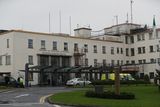Stardust inquest: Gardaí will review coroner’s report ‘at highest level’ before decision on any criminal charges
Stardust victims remembered - They never came home
The coroner’s report into the Stardust tragedy will be reviewed by gardaí “at the highest level” before a decision is made on the direction of a potential criminal action, if any.
An inquest jury found that all 48 people who died in the Artane nightclub in Dublin in the early hours of February 14 were unlawfully killed. No liability was found against any individual or company as part of the inquest verdict.
Gardaí await the coroner’s report on the matter, which will be examined thoroughly to determine what, if any, criminal offences may have occurred.
“When the coroner’s report arrives to gardaí, it will be assessed and reviewed very seriously, at the very highest level,” a source said.
Due to the serious nature of this case, it is expected gardaí will receive the report promptly.
“Nothing can be done on this matter until gardaí have received the inquest report,” the source added.
As the statute of limitations does not apply in this case, individuals such as Eamon Butterly could potentially face criminal charges. “In principle, he absolutely could [face criminal charges],” a leading criminal law academic said.
“The sort of consideration that the DPP will take into account will be the extent to which detail that came out in the inquest will be able to be brought forward at trial and if it’s brought forward at trial, that it will persuade another jury.
“Another consideration is, ‘Is there a public interest in proceeding with a trial at this remove, as this happened in 1981?
“Ultimately, I think there will be a question of what the charge would be, whether the evidence in the tribunal is sufficient for the DPP to think, ‘Yes, we can run the same or similar evidence and get the same or similar outcome.’
“Ninety-nine per cent of the time there isn’t public interest that needs to be taken into account, but this situation is almost certainly in that 1pc. There is a lot of public interest in Stardust.”
An inquest is an inquisitorial hearing to establish the facts concerning the who, how, when, where and circumstances of a person’s death.
It is not an exercise of considering or apportioning blame or exoneration.
That said, a finding of unlawful killing will not be ignored by An Garda Síochána and will give rise, at a minimum, to a careful examination of the coroner’s file.
A statute of limitations does not apply in relation to a potential criminal prosecution, so it is possible for charges to still be brought in connection with a tragedy that happened 43 years ago.
One thing the verdict does not really open the door to is civil damages claims by the families. A two-year statute applies for personal injury claims.
This, in itself, is not a bar to the filing of a civil damages claim. It would be up to the defendant to argue that it is statute-barred. But that argument would be likely to succeed.
“There is nothing to stop someone issuing a plenary summons in relation to something that happened in 1981. It is up to the defendant to plead the statute of limitations,” one senior counsel said.
“A defendant would be likely to raise it and it would likely be found to be statute-barred.”
The barrister said any argument that the beginning of the statute period could be reset to now in light of the verdict would be unlikely to succeed.
“There is nothing in legislation that says an inquest verdict of unlawful killing 43 years later suddenly changes the statute. The statute still ran from the day the fire happened,” the senior counsel said.
“An argument could be made that it is only now they have acquired this knowledge of unlawful killing.
“But unlawful killing is only a verdict. It is not the knowledge from their expert reports. The families have had expert reports going back 10 or 15 years with particular theories.”
Read more
While a civil damages claim by relatives looks unlikely, what cannot be ruled out, based on recent events, is a challenge to the inquest jury’s verdict.
Former Stardust manager Eamon Butterly twice took High Court challenges seeking to prohibit the jury from bringing in a verdict of unlawful killing.
Before the inquests began, he sought an order prohibiting the coroner, Dr Myra Cullinane, from conducting them in a manner which involved an investigation or the consideration of a possible verdict of unlawful killing.
He also sought an order quashing the coroner’s decision at pre-inquest hearings to refuse to rule out an unlawful killing verdict.
Mr Justice Charles Meenan refused Mr Butterly’s application and said he was satisfied the ruling by Dr Cullinane, that a verdict of unlawful killing could not be ruled out, was correct in law.
A second legal challenge was mounted by Mr Butterly shortly after the jury began its deliberations.
This too was rejected, this time by Mr Justice Tony O’Connor.
The judicial review application could not be reported on at the time.
Mr Butterly’s lawyers argued that such a verdict would be highly prejudicial and would damage his reputation.
They also argued it was not lawfully open for a jury to attribute blame to any individual or individuals.
The judge said he was not satisfied the coroner had misdirected herself on the issue.
Mr Justice O’Connor also questioned whether the challenge was premature, and asked if such an action should instead be brought after the verdict had been given.
Mr Butterly’s solicitors were contacted for comment about the possibility of a further challenge. However, no response was received at the time of going to press.
Susan Behan, whose brother John Colgan (21) died in the Stardust fire, said this morning she’s “relieved” that “finally we have the justice we deserved”.
“It just means so much to us as a family, to myself, to all of the families to finally hear that our loved ones were unlawfully killed,” she told RTÉ Radio One’s Morning Ireland.
“We were just in disbelief yesterday, afraid to even breathe at times, that maybe we might get justice after all this.
“But when we heard it, it was just unreal, all those emotions, 43 years of wondering, and then we finally hear those words,” she said.
She added they are happy that “justice had prevailed”.
“The truth was actually out there, and everyone can see it now, it's not just us saying an injustice has been done. It has been done, it was an unlawful killing.
“We were just all looking at each other and hugging each other, crying, jumping.
“43 years of pent-up anxiety, and we just heard those words. We nearly all fell to the ground and we just erupted in roars and screams and cries, we just could not believe it,” she said.
Mrs Behan said an official apology was important for the families as they were “ignored”.
“I feel they were so disrespectful to us, and we were left to our own devices. That shouldn't have been the case, so now it shouldn't be a big deal for them to turn around and say: ‘We're sorry. We got it wrong’, and apologise to us.
“It's the very least they could do. And it shouldn't take them a long time to know what to do - do the right thing and give the public apology.
“We deserve this. Our loved ones deserve this," she said.
Susan Behan also paid a tribute to her late brother who died in the Stardust disaster.
“When he was taken from us awfully, it just ripped the inside of our family apart because he was so special to us. He had this huge heart, this softness about him when he was around, he was funny.
“Everybody that met him actually loved him, even to this day, people come up to me and say: ‘I knew Johnny, he was a lovely lad'.
"We've all got so many beautiful stories about our loved ones.”
A 21-year-old John Colgan was looking forward to his future, and was excited to meet his niece, as Susan was pregnant with her first baby.
“I was expecting our first baby in the house. And there was about four weeks for me to go and he kept patting my tummy and saying: ‘Does it know I'm going to be an uncle?”
"He was super excited about it,” she said.
Read more
Join the Irish Independent WhatsApp channel
Stay up to date with all the latest news














